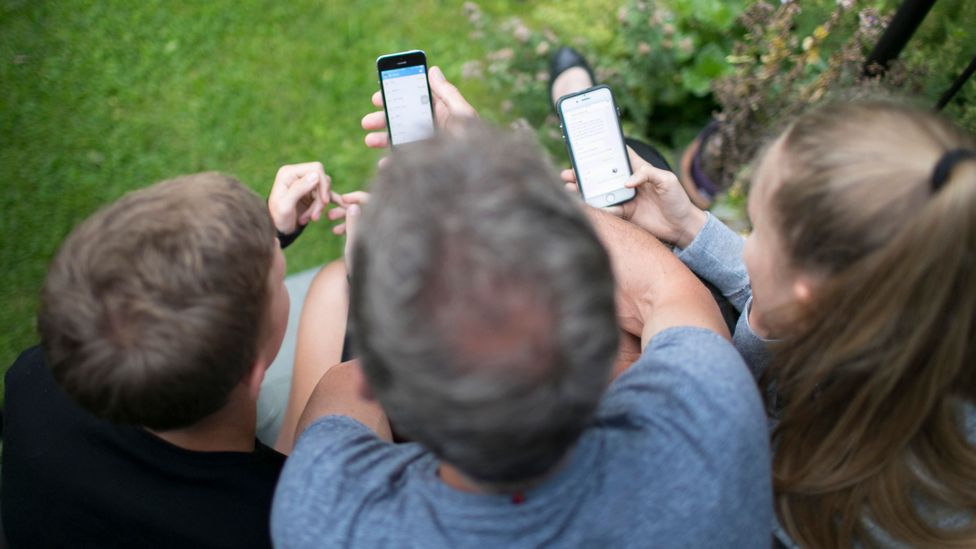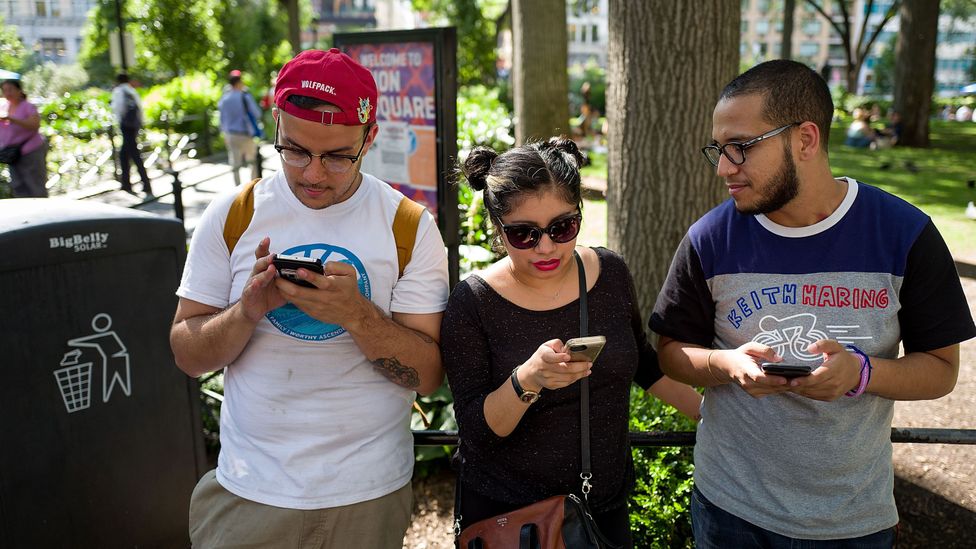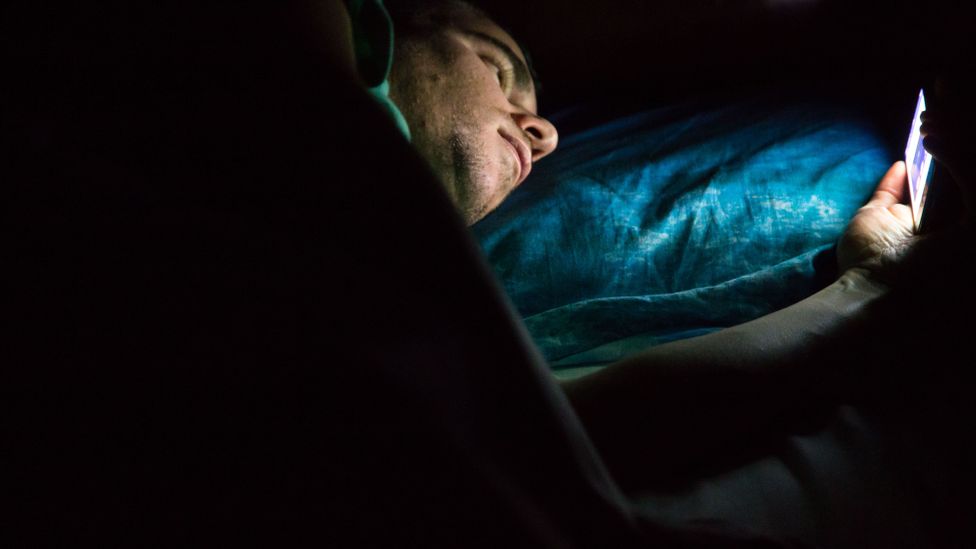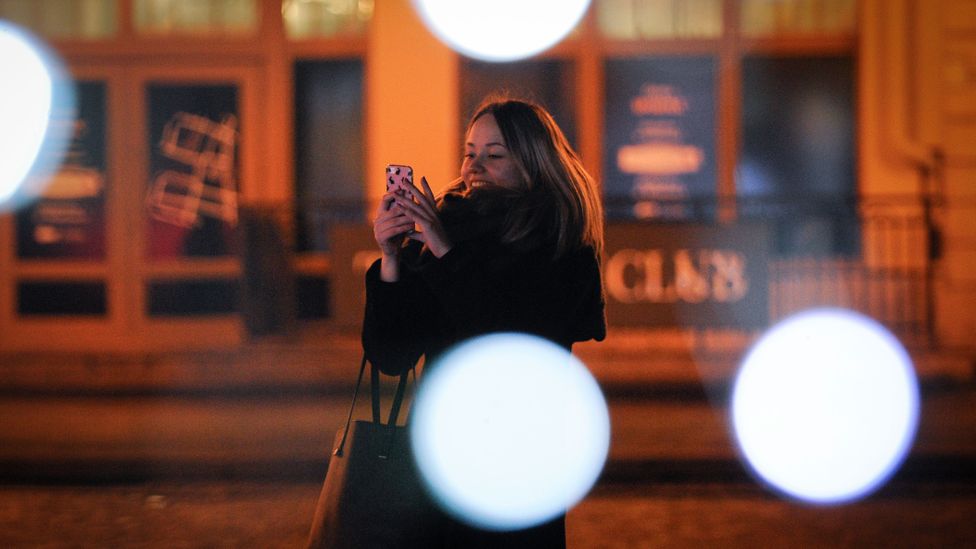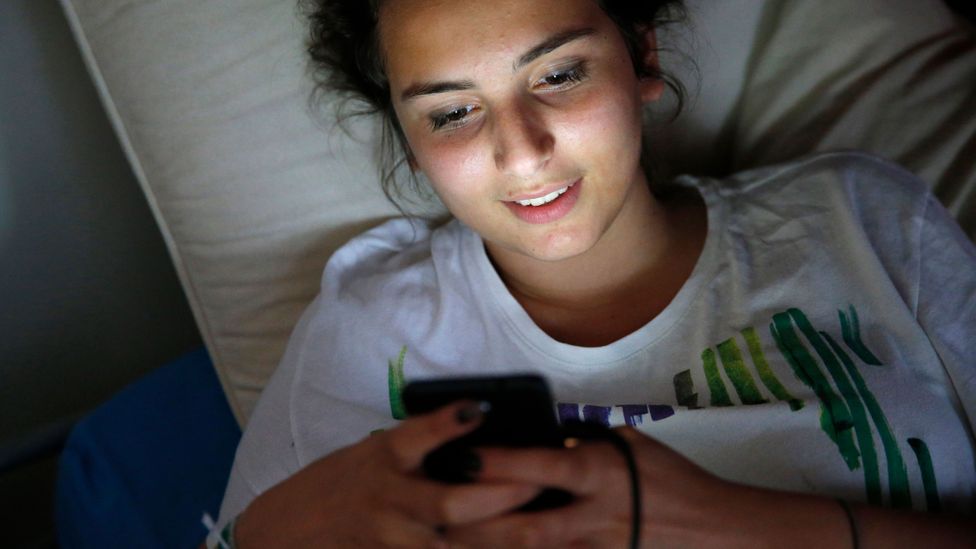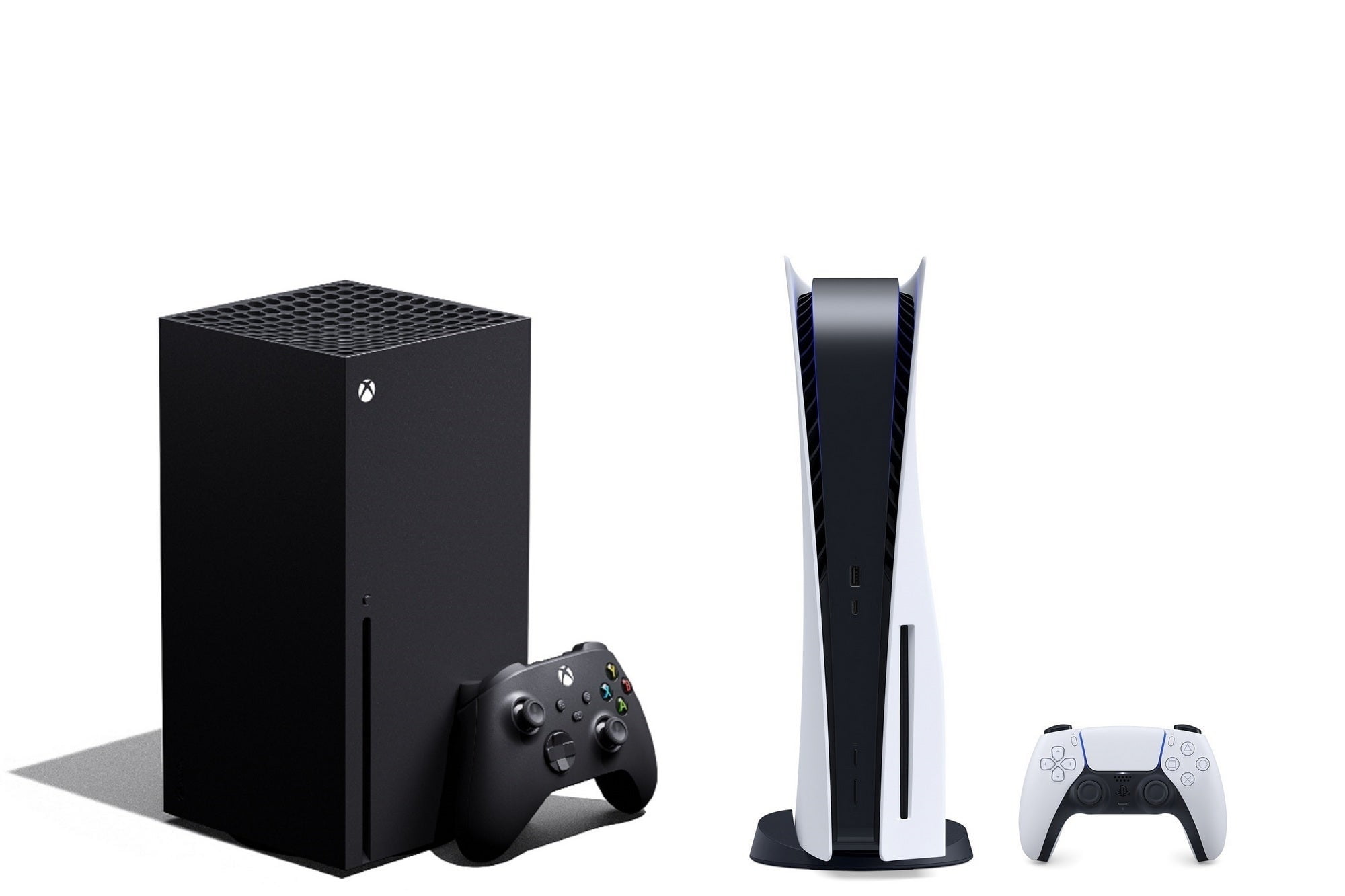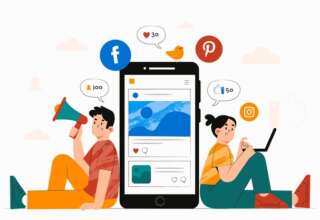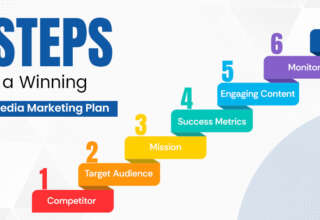Three billion people, around 40% of the world’s population, use online social media – and we’re spending an average of two hours every day sharing, liking, tweeting and updating on these platforms, according to some reports. That breaks down to around half a million tweets and Snapchat photos shared every minute.
With social media playing such a big part in our lives, could we be sacrificing our mental health and well-being as well as our time? What does the evidence actually suggest?
- Facebook responds to mental well-being claims
- Is it time to rethink how we use social media? An introduction to our #LikeMinded season
Since social media is relatively new to us, conclusive findings are limited. The research that does exist mainly relies on self-reporting, which can often be flawed, and the majority of studies focus on Facebook. That said, this is a fast-growing area of research, and clues are beginning to emerge. BBC Future reviewed the findings of some of the science so far:
STRESS
People use social media to vent about everything from customer service to politics, but the downside to this is that our feeds often resemble an endless stream of stress. In 2015, researchers at the Pew Research Center based in Washington DC sought to find out if social media induces more stress than it relieves.
In the survey of 1,800 people, women reported being more stressed than men. Twitter was found to be a “significant contributor” because it increased their awareness of other people’s stress.
But Twitter also acted as a coping mechanism – and the more women used it, the less stressed they were. The same effect wasn’t found for men, whom the researchers said had a more distant relationship with social media. Overall, the researchers concluded that social media use was linked to “modestly lower levels” of stress.
In 2014, researchers in Austria found that participants reported lower moods after using Facebook for 20 minutes compared to those who just browsed the internet. The study suggested that people felt that way because they saw it as a waste of time.
A good or bad mood may also spread between people on social media, according to researchers from the University of California, who assessed the emotional content of over a billion status updates from more than 100 million Facebook users between 2009 and 2012.
Bad weather increased the number of negative posts by 1%, and the researchers found that one negative post by someone in a rainy city influenced another 1.3 negative posts by friends living in dry cities. The better news is that happy posts had a stronger influence; each one inspired 1.75 more happy posts. Whether a happy post translates to a genuine boost in mood, however, remains unclear.
ANXIETY
Researchers have looked at general anxiety provoked by social media, characterised by feelings of restlessness and worry, and trouble sleeping and concentrating. A study published in the journal Computers and Human Behaviour found that people who report using seven or more social media platforms were more than three times as likely as people using 0-2 platforms to have high levels of general anxiety symptoms.
That said, it’s unclear if and how social media causes anxiety. Researchers from Babes-Bolyai University in Romania reviewed existing research on the relationship between social anxiety and social networking in 2016, and said the results were mixed. They concluded that more research needs to be done.
DEPRESSION
While some studies have found a link between depression and social media use, there is emerging research into how social media can actually be a force for good.
Two studies involving more than 700 students found that depressive symptoms, such as low mood and feelings of worthlessness and hopelessness, were linked to the quality of online interactions. Researchers found higher levels of depressive symptoms among those who reported having more negative interactions.
A similar study conducted in 2016 involving 1,700 people found a threefold risk of depression and anxiety among people who used the most social media platforms. Reasons for this, they suggested, include cyber-bullying, having a distorted view of other people’s lives, and feeling like time spent on social media is a waste.
However, as BBC Future will explore this month in our #LikeMinded season, scientists are also looking at how social media can be used to diagnose depression, which could help people receive treatment earlier. Researchers for Microsoft surveyed 476 people and analysed their Twitter profiles for depressive language, linguistic style, engagement and emotion. From this, they developed a classifier that can accurately predict depression before it causes symptoms in seven out of 10 cases.
Researchers from Harvard and Vermont Universities analysed 166 people’s Instagram photos to create a similar tool last year with the same success rate.
SLEEP
Humans used to spend their evenings in darkness, but now we’re surrounded by artificial lighting all day and night. Research has found that this can inhibit the body’s production of the hormone melatonin, which facilitates sleep – and blue light, which is emitted by smartphone and laptop screens, is said to be the worst culprit. In other words, if you lie on the pillow at night checking Facebook and Twitter, you’re headed for restless slumber.
Last year, researchers from the University of Pittsburgh asked 1,700 18- to 30-year-olds about their social media and sleeping habits. They found a link with sleep disturbances – and concluded blue light had a part to play. How often they logged on, rather than time spent on social media sites, was a higher predictor of disturbed sleep, suggesting “an obsessive ‘checking’”, the researchers said.
The researchers say this could be caused by physiological arousal before sleep, and the bright lights of our devices can delay circadian rhythms. But they couldn’t clarify whether social media causes disturbed sleep, or if those who have disturbed sleep spend more time on social media.
ADDICTION
Despite the argument from a few researchers that tweeting may be harder to resist than cigarettes and alcohol, social media addiction isn’t included in the latest diagnostic manual for mental health disorders.
That said, social media is changing faster than scientists can keep up with, so various groups are trying to study compulsive behaviours related to its use – for example, scientists from the Netherlands have invented their own scale to identify possible addiction.
And if social media addiction does exist, it would be a type of internet addiction – and that is a classified disorder. In 2011, Daria Kuss and Mark Griffiths from Nottingham Trent University in the UK have analysed 43 previous studies on the matter, and conclude that social media addiction is a mental health problem that “may” require professional treatment. They found that excessive usage was linked to relationship problems, worse academic achievement and less participation in offline communities, and found that those who could be more vulnerable to a social media addiction include those dependent on alcohol, the highly extroverted, and those who use social media to compensate for fewer ties in real life.
SELF-ESTEEM
Women’s magazines and their use of underweight and Photoshopped models have been long maligned for stirring self-esteem issues among young women. But now, social media, with its filters and lighting and clever angles, is taking over as a primary concern among some campaigning groups and charities.
Social media sites make more than half of users feel inadequate, according to a survey of 1,500 people by disability charity Scope, and half of 18- to 34-year-olds say it makes them feel unattractive.
A 2016 study by researchers at Penn State University suggested that viewing other people’s selfies lowered self-esteem, because users compare themselves to photos of people looking their happiest. Research from the University of Strathclyde, Ohio University and University of Iowa also found that women compare themselves negatively to selfies of other women.
But it’s not just selfies that have the potential to dent self-esteem. A study of 1,000 Swedish Facebook users found that women who spent more time on Facebook reported feeling less happy and confident. The researchers concluded: “When Facebook users compare their own lives with others’ seemingly more successful careers and happy relationships, they may feel that their own lives are less successful in comparison.”
But one small study hinted that viewing your own profile, not others, might offer ego boosts. Researchers at Cornell University in New York put 63 students into different groups. Some sat with a mirror placed against a computer screen, for instance, while others sat in front of their own Facebook profile.
Facebook had a positive effect on self-esteem compared to other activities that boost self-awareness. Mirrors and photos, the researchers explained, make us compare ourselves to social standards, whereas looking at our own Facebook profiles might boost self-esteem because it is easier to control how we’re presented to the world.
WELL-BEING
In a study from 2013, researchers texted 79 participants five times a day for 14 days, asking them how they felt and how much they’d used Facebook since the last text. The more time people spent on the site, the worse they felt later on, and the more their life satisfaction declined over time.
But other research has found, that for some people, social media can help boost their well-being. Marketing researchers Jonah Berger and Eva Buechel found that people who are emotionally unstable are more likely to post about their emotions, which can help them receive support and bounce back after negative experiences.
Overall, social media’s effects on well-being are ambiguous, according to a paper written last year by researchers from the Netherlands. However, they suggested there is clearer evidence for the impact on one group of people: social media has a more negative effect on the well-being of those who are more socially isolated.
RELATIONSHIPS
If you’ve ever been talking to a friend who’s pulled their phone out to scroll through Instagram, you might have wondered what social media is doing to relationships.
Even the mere presence of a phone can interfere with our interactions, particularly when we’re talking about something meaningful, according to one small study. Researchers writing in the Journal of Social and Personal Relationships tasked 34 pairs of strangers with having a 10-minute conversation about an interesting event that had happened to them recently. Each pair sat in private booths, and half had a mobile phone on the top of their table.
Those with a phone in eyeshot were less positive when recalling their interaction afterwards, had less meaningful conversations and reported feeling less close to their partner than the others, who had a notebook on top of the table instead.
Romantic relationships aren’t immune, either. Researchers at the University of Guelph in Canada surveyed 300 people aged 17-24 in 2009 about any jealousy they felt when on Facebook, asking questions such as, ‘How likely are you to become jealous after your partner has added an unknown member of the opposite sex?’.
Women spent much more time on Facebook then men, and experienced significantly more jealousy when doing so. The researchers concluded they “felt the Facebook environment created these feelings and enhanced concerns about the quality of their relationship”.
ENVY
In a study involving 600 adults, roughly a third said social media made them feel negative emotions – mainly frustration – and envy was the main cause. This was triggered by comparing their lives to others’, and the biggest culprit was other people’s travel photos. Feeling envious caused an “envy spiral”, where people react to envy by adding to their profiles more of the same sort of content that made them jealous in the first place.
However, envy isn’t necessarily a destructive emotion – it can often make us work harder, according to researchers from Michigan University and the University of Wisconsin-Milwaukee. They asked 380 students to look at “envy-eliciting” photos and texts from Facebook and Twitter, including posts about buying expensive goods, travelling and getting engaged. But the type of envy the researchers found is “benign envy”, which they say is more likely to make a person work harder.
LONELINESS
A study published in the American Journal of Preventive Medicine last year surveyed 7,000 19- to 32-year-olds and found that those who spend the most time on social media were twice as likely to report experiencing social isolation, which can include a lack of a sense of social belonging, engagement with others and fulfilling relationships.
Spending more time on social media, the researchers said, could displace face-to-face interaction, and can also make people feel excluded.
“Exposure to such highly idealised representations of peers’ lives may elicit feelings of envy and the distorted belief that others lead happier and more successful lives, which may increase perceived social isolation.”
CONCLUSIONS?
It’s clear that in many areas, not enough is known yet to draw many strong conclusions. However, the evidence does point one way: social media affects people differently, depending on pre-existing conditions and personality traits.
As with food, gambling and many other temptations of the modern age, excessive use for some individuals is probably inadvisable. But at the same time, it would be wrong to say social media is a universally bad thing, because clearly it brings myriad benefits to our lives.
We’ll be exploring this tension more over the next month, in a series of articles and videos in our special series #LikeMinded – and hopefully providing solutions that could help us all live a happier, healthier digital life.
[“source=bbc”]
